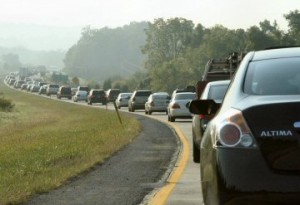The tolling of Rt. 422 was front-page headlines in Sunday’s Philadelphia Inquirer. Rising to the top of the local news charts, the tolling of 422 is not ‘new’ news for most of us. Unless you have had your head buried in the sand, you could not have missed this much discussed campaign topic during the last State House 157 election cycle. There was much heated debate from both sides on the ‘to toll or not to toll’ 422 issue.
If you are one of the 110,000+ commuters who daily sit in parking lot gridlock, known as Rt. 422, it looks like there may be light at the end of the tunnel. Tomorrow (Monday), Barry Seymour of Delaware Valley Regional Planning Commission (DVRPC) will present agenda item, ‘US 422 Plus: A Proposal for Funding Improvements’ (click here for agenda) to the Governors Transportation Funding Advisory Committee. The DVRPC $625K plan “would create a locally run authority to collect 11 cents per mile and keep that money to fund improvements such as new lanes”. Seymour hopes his DVRPC plan will convince the advisory committee and ultimately Gov. Corbett of the value of the 422-tolling project.
If granted legislative approval, the project would become the first locally managed highway toll system of its kind in Pennsylvania . . . a ‘model’ for the state. All of the revenue would be devoted to 422-corridor projects and DVRPC plan supporters believe that making Rt. 422 a toll road in Berks, Montgomery and Chester counties is the only way to pay for a new passenger-rail service to Reading and to finance the badly needed upgrades to the congested highway.
Others voice opposition to the 422 tolling issue, including our own State Rep Warren Kampf. Still standing behind his campaign promise to voters not to toll 422, Kampf believes that “Tolling is just another way of taxing people going to work in these hard economic times. They’re already paying a lot of money in gas taxes and other fees” and he doesn’t “think that this is something they want.”
Where does this leave the frustrated, brake-slamming, horn-worthy commuters who suffer the daily use of Route 422? Maybe answers will emerge as the day of reckoning begins in Harrisburg tomorrow.


